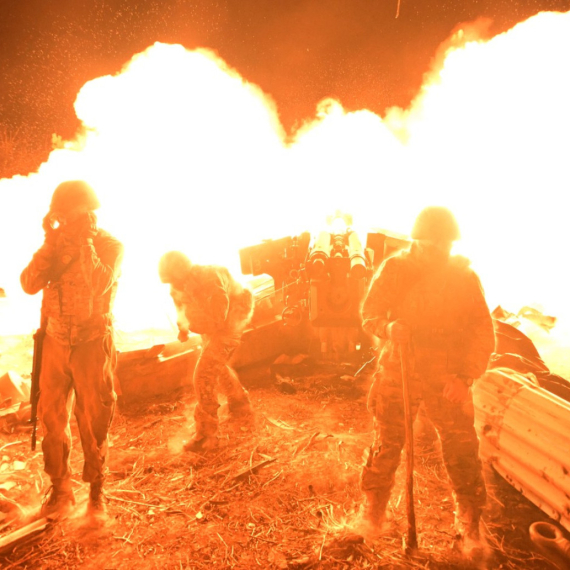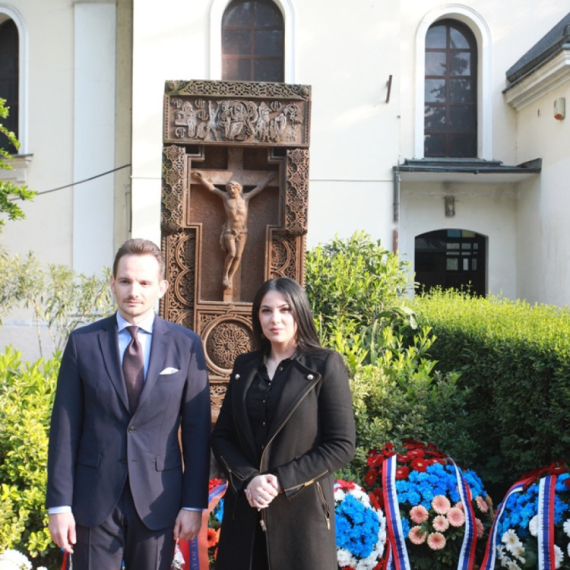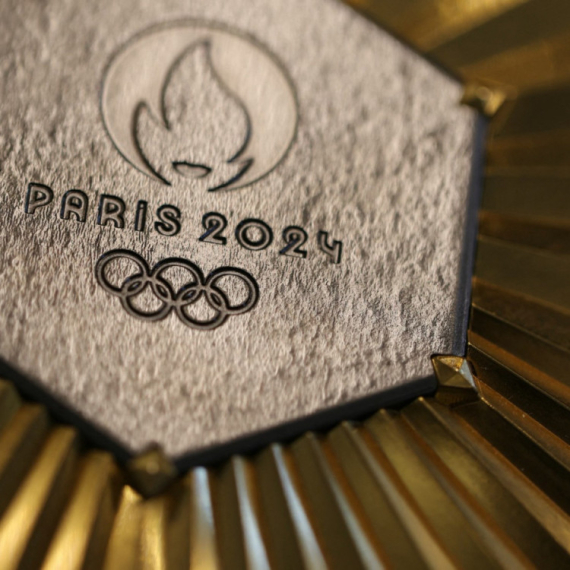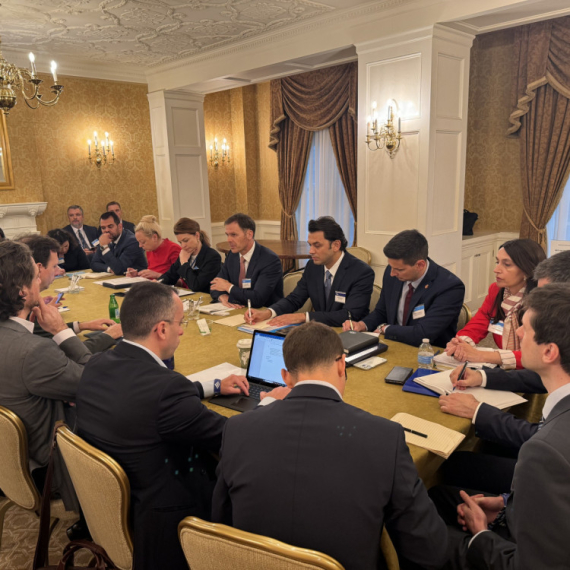"Difficult, frank discussions held in Kosovo"
Talks between Aleksandar Vučić and Serbs in northern Kosovo on Sunday were difficult but open, says Marko Đurić, an adviser to the Serbian president.
Monday, 13.05.2013.
11:30

BELGRADE Talks between Aleksandar Vucic and Serbs in northern Kosovo on Sunday were difficult but open, says Marko Djuric, an adviser to the Serbian president. He also praised the first deputy prime minister for "showing the degree of sincerity with which the Serbs have not met in a long time." "Difficult, frank discussions held in Kosovo" Djuric told B92 on Monday in Belgrade said that the views of the two sides - the government which accepted the Brussels agreement with Pristina and the Serbs who oppose it - are now "closer and somewhat clearer." "Vucic entered into all the details of the agreement and for hours answered questions," Djuric said. "I think it has been succeeded to eliminate at least some of the concerns with that, and to answer at least some questions that concern the Serbs in northern Kosovo," said this presidential adviser. "Vucic was completely honest and spoke sincerely, as anyone does who wishes good to the people and the country. In previous years, the truth was not spoken, and we only in the past few months began to discover what and how had been negotiated," Djuric claimed. According to him, "the truth was not opened up for the first time yesterday in Kosovo but this visit was the first in which a senior official was willing to answer all questions, while some of the comments said that nobody since Slobodan Milosevic had answered the most difficult questions in Kosovo with Serbs." When asked why Vucic went to Kosovo, Djuric said that it was "always better, more convincing and honest to relay directly to those concerned, and to their face." "The time of the adoption of the policy from cabinets is over... One needs to come to the door and tell people that the country is with them, because they feel isolated, have no opportunity to communicate directly with the authorities of Serbia. Therefore, this is the message to them that the government will stand by them," said he. Asked about the progress he said had been made, Djuric stressed that " we cannot fight for the rights of Kosovo Serbs without their participation." "I think we are closer to making people understand what are the benefits and what are the disadvantages of this agreement and for them to realize that this is the maximum for which the negotiators managed to fight for." He added that "a part of the public" deliberately misinterpreted the agreement in order to score political points, describing the deal as "frightening for the people in Kosovo". But this, said the adviser, was irresponsible. "On the other hand, those of us who participate in this process are open about the circumstances and content of the agreement. Our responsibility is to preserve our people and are that they survive there." Djuric then stated that this "part of the public" that who was wrongly interpreting the agreement was "in the minority and cannot in a serious way influence the unity that is created in Serbia in resolving this issue." Djuric explained that the "unity" was reached about "entering into a new phase of solving the issue of Serbs from Kosovo and Metohija." He also pointed out that the agreement reached on April 19 was "only the first one," as the issues of the Church, property and others were yet to be discussed. "The negotiation process cannot be completed until all questions are completed. And only after all that is finished will see that the position of the Serbs will be more rounded, more stable. Nobody will abolish the institutions that will be created, nobody will terrorize Serbs in Kosovo with an army," he concluded. Speaking of the Brussels talks, Djuric, who is also a member of the team to develop a plan of implementation, said that those talks were interrupted because the Pristina delegation was experiencing "jumps in pressure and loss of patience" when it comes to a future community Serbian municipalities, and wanted to focus only on the obligations of the Serb side. "We need to get clear legal guarantees on how the institutions of the community of Serb municipalities will operate, how judicial institutions will be structured. This is what should be provided in the legal framework and it is something that we are fighting for in Brussels," explained the adviser. Djjuric also said that "our team is ready to resume that battle as soon as possible, because there is no time to lose and it does not want to open up space for doubts." (Tanjug, file) B92
"Difficult, frank discussions held in Kosovo"
Đurić told B92 on Monday in Belgrade said that the views of the two sides - the government which accepted the Brussels agreement with Priština and the Serbs who oppose it - are now "closer and somewhat clearer.""Vučić entered into all the details of the agreement and for hours answered questions," Đurić said.
"I think it has been succeeded to eliminate at least some of the concerns with that, and to answer at least some questions that concern the Serbs in northern Kosovo," said this presidential adviser.
"Vučić was completely honest and spoke sincerely, as anyone does who wishes good to the people and the country. In previous years, the truth was not spoken, and we only in the past few months began to discover what and how had been negotiated," Đurić claimed.
According to him, "the truth was not opened up for the first time yesterday in Kosovo but this visit was the first in which a senior official was willing to answer all questions, while some of the comments said that nobody since Slobodan Milošević had answered the most difficult questions in Kosovo with Serbs."
When asked why Vučić went to Kosovo, Đurić said that it was "always better, more convincing and honest to relay directly to those concerned, and to their face."
"The time of the adoption of the policy from cabinets is over... One needs to come to the door and tell people that the country is with them, because they feel isolated, have no opportunity to communicate directly with the authorities of Serbia. Therefore, this is the message to them that the government will stand by them," said he.
Asked about the progress he said had been made, Đurić stressed that " we cannot fight for the rights of Kosovo Serbs without their participation."
"I think we are closer to making people understand what are the benefits and what are the disadvantages of this agreement and for them to realize that this is the maximum for which the negotiators managed to fight for."
He added that "a part of the public" deliberately misinterpreted the agreement in order to score political points, describing the deal as "frightening for the people in Kosovo". But this, said the adviser, was irresponsible.
"On the other hand, those of us who participate in this process are open about the circumstances and content of the agreement. Our responsibility is to preserve our people and are that they survive there."
Đurić then stated that this "part of the public" that who was wrongly interpreting the agreement was "in the minority and cannot in a serious way influence the unity that is created in Serbia in resolving this issue." Đurić explained that the "unity" was reached about "entering into a new phase of solving the issue of Serbs from Kosovo and Metohija."
He also pointed out that the agreement reached on April 19 was "only the first one," as the issues of the Church, property and others were yet to be discussed.
"The negotiation process cannot be completed until all questions are completed. And only after all that is finished will see that the position of the Serbs will be more rounded, more stable. Nobody will abolish the institutions that will be created, nobody will terrorize Serbs in Kosovo with an army," he concluded.
Speaking of the Brussels talks, Đurić, who is also a member of the team to develop a plan of implementation, said that those talks were interrupted because the Priština delegation was experiencing "jumps in pressure and loss of patience" when it comes to a future community Serbian municipalities, and wanted to focus only on the obligations of the Serb side.
"We need to get clear legal guarantees on how the institutions of the community of Serb municipalities will operate, how judicial institutions will be structured. This is what should be provided in the legal framework and it is something that we are fighting for in Brussels," explained the adviser.
Đjurić also said that "our team is ready to resume that battle as soon as possible, because there is no time to lose and it does not want to open up space for doubts."














































Komentari 3
Pogledaj komentare